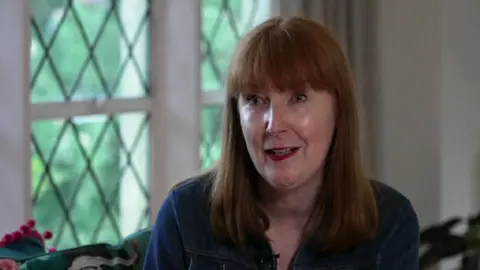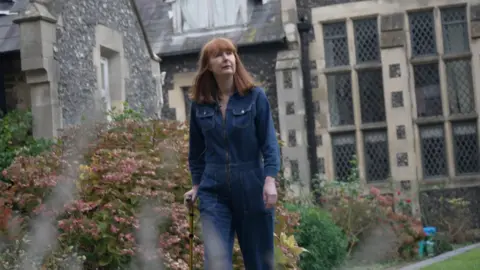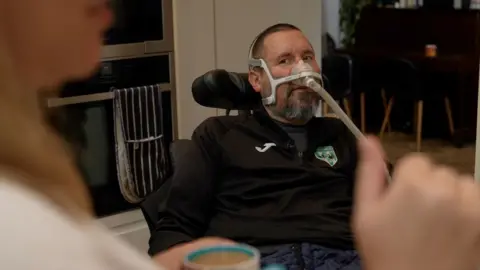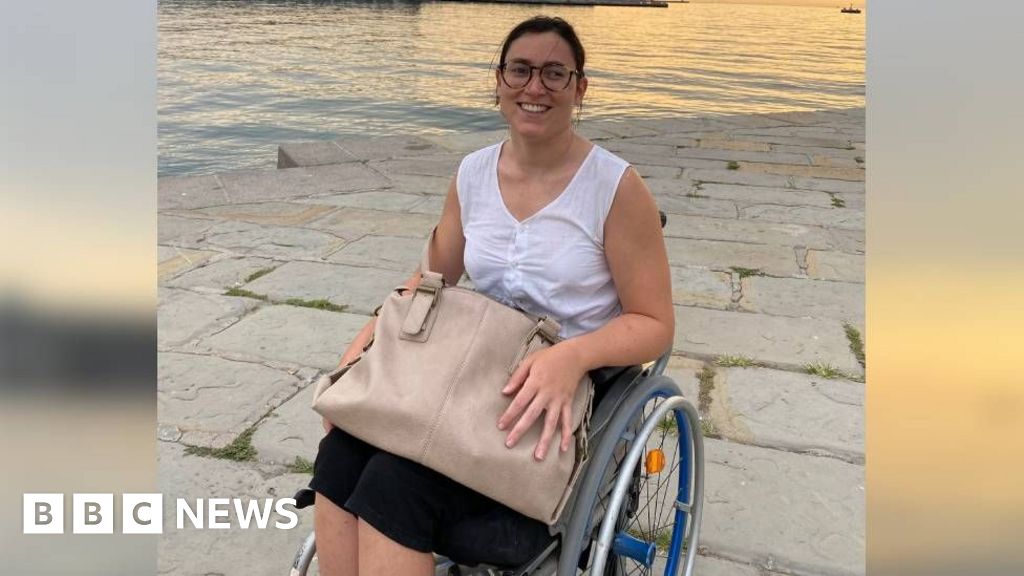
 BBC
BBC
Nik Ward is disappointed the bill has passed and worries about its implications for vulnerable people
Terminally ill people are a step closer to being able to choose when they die after MPs voted to support a proposed change to the law.
The right to an assisted death will be granted to people with life expectancies of six months or less provided their request is approved by two doctors and a judge.
It is is one of the most significant and sensitive topics to have been voted on by MPs in recent decades - though it still needs to clear further rounds of voting before it can be implemented.
Two weeks ago BBC News interviewed two terminally ill people about their feelings on the assisted dying bill and we spoke to them again following the vote on Friday afternoon.
"I'm over the moon, I'm so happy," says Elise Burns, whose cancer means she lives in constant pain.
"The bill is going to save so many unnecessarily painful and horrible deaths - as well as the families and loved ones who would have had to see them go through it."
She was watching the debate on assisted dying from the public gallery in the House of Commons having joined the campaign in favour a few months ago.
Elise, 50, is terminally ill after breast cancer spread to other parts of her body, including her bones - her femur had to be replaced by a metal rod after it was rotted by cancerous cells.
More on assisted dying:
"I'm completely and utterly shell-shocked. I was obviously hoping for the best but preparing for the worst," adds Elise, who thought MPs might decide against the bill having witnessed the debate in person.
Nik Ward, who has motor neurone disease and opposes changing the law on assisted dying, told us: "Obviously I'm a bit disappointed."
He watched the debate and vote at home.
"But, at the same time, the point was made several times [during the debate] that since the last vote nine years ago there has been very little improvement in palliative care."
Also known as end of life care, this service is for those people in the final months and years of their lives.
It can be received at home or in a care home, hospice or hospital - depending on the needs and preferences of the patient.
Opponents of the assisted dying bill think this service needs to be better funded if terminally ill people are to make a genuine choice between dying naturally or choosing to die earlier.
"There has not been much discussion and maybe, over the coming years before the [assisted dying] bill is implemented, there will be time for a comprehensive review," adds Nik.


Elise Burns says passing the bill will provide a choice to terminally ill people living in pain like her
The 53-year-old has been told for the past five years that he is terminally ill and knows he could die tomorrow by choking on food or on his own saliva.
Another concern he has about the bill being passed is that terminally ill people, vulnerable as they face the emotions of dying soon, will choose to end their lives unnecessarily early for what they consider to be noble reasons.
"It's the good people, the people who are trying to be virtuous, who are dignified and trying to do the right thing - they are the ones I'm worried about and think [this law] could be problematic for," he tells us.
"It will be the grandmother in the care home that doesn't want to spend all the money she's got in her savings account because she wants her grandchildren to get it," he says. "It will be people like her who seek to end their lives."
He adds: "This is despite the fact her grandchildren will be likely to value the last of the time they have got with her more than they are an additional £10,000 or £20,000.
"People will make a [life or death] decision based on internal judgements that aren't necessarily accurate because people don't have honest conversations about death."
He says better conversations would help people who are terminally ill make the most of the time they have left with their loved ones, and so choose not to end their lives early.


Elise lives in constant pain after cancer rotted her femur which was replaced by a metal rod
"Ironically, I think what people say and do at the end of their lives is utterly defining of their life," says Nik.
For Elise, she knows the end of her life will be one filled with increasing pain and suffering as her body becomes more tolerant of the morphine she uses - making it less effective as a painkiller.
She is terrified of a painful death and is glad the bill will eventually grant people like her a choice.
"It gives them the right to a good death, that's really important," she says.
She explains it will also spare people the stress of taking terminally ill loved ones abroad to die - and the fear of prosecution upon their return.
"It's going to save a lot of pain and trauma."
One of the things that struck her and Nik during the debate was the way MPs behaved.
"I thought by and large it was conducted very respectfully on both sides," she says and she hopes that will encourage people at home to talk about the issue in a similar manner.


Nik says, despite the outcome of the vote, he thought the debate was edifying and how democracy should work
Nik goes further and says it was "absolutely edifying".
He adds: "It was very grown up and I wish there would be more of it. It's the way a democracy should work."
For Elise and her fellow campaigners, the democratic system has worked in their favour on this occasion.
"I'm just so delighted for everyone," she says. "[Assisted dying] is something I've always felt strongly about, though it didn't occur to me that one day I might need it."
For her the bill has likely come too late as she will probably be dead by the time it takes effect.
She is arranging to use the assisted dying service offered by Dignitas in Switzerland before the pain caused by her cancer becomes too much to bear.
Until then she will be making the most of her time with her family and celebrating with fellow campaigners after achieving this latest step in changing the law.
"I'm just incredibly grateful that me and tens of thousands of other people will be given the choice of a good death," she tells us. "Or to shorten a bad one."


HARDtalk - The UK's assisted dying debate
The UK parliament is considering proposals to legalise assisted dying. It would bring it in line with several European countries, Canada and a number of US states. Stephen Sackur speaks to actor and disability rights campaigner Liz Carr on whether the focus on a ‘good death’ is detracting from the right to a good life?
 (1).png)
 3 weeks ago
4
3 weeks ago
4













